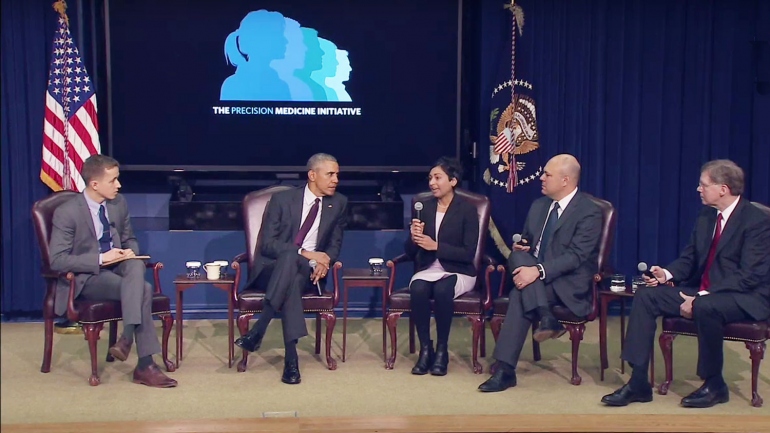UC Health Pledges Improved Data-Sharing with Patients at White House Precision Medicine Summit

UC Health committed to enabling patients to access and share their own health data, joining more than 40 other organizations that made various commitments to advance precision medicine during a White House summit this week.
The Precision Medicine Initiative Summit, hosted by President Barack Obama, brought together patients, researchers and health leaders to discuss progress made during the one year since the launch of the initiative. Four UC San Francisco leaders and researchers were among those invited to participate in the Feb. 25 summit, which featured a panel discussion with the President and included a closed-door roundtable discussion about the future of precision medicine.
UC Health joined dozens of health care providers, universities, government agencies, tech startups and nonprofits in announcing specific new commitments to support the goals of the Precision Medicine Initiative. It plans to give patients the tools to download their own health data from any of the five UC Health medical centers, and share the information with providers for more effective personalized care and with researchers to accelerate the development of treatments and cures.
The commitment stated: “Today, many UC Health patients have access to basic ‘Blue Button’ technology offered through various patient portals in conjunction with electronic health records systems. Starting in 2017, the more than 14 million UC Health patients will be able to use a more comprehensive ‘Blue and Gold Button’ to download their integrated clinical data from across all participating UC sites, enabling them to make better choices about their health and contribute their own data for research.”
A recent UCSF partnership with Cisco aims to build this interoperability platform for sharing information efficiently and securely.
“UC Health is committed to advancing precision medicine,” said John Stobo, MD, UC Health executive vice president. “We support the White House’s Precision Medicine Initiative and are working to harness our data to deliver the right treatment at the right time to the right person.”
UC Health was represented at the summit by Atul Butte, MD, PhD, executive director of clinical informatics for UC Health and leader of the California Initiative to Advance Precision Medicine; Keith Yamamoto, PhD, vice chancellor of Science Policy and Strategy at UCSF; Esteban Burchard, MD, MPH, a member of Obama’s 15-person Precision Medicine Initiative Working Group, which has advised Obama and the National Institutes of Health in the initiative’s first year; and Kathy Giacomini, PhD, a professor of Bioengineering and Therapeutic Sciences in UCSF’s schools of Pharmacy and Medicine.
“The president stressed that understanding biological mechanisms is the key to understanding disease,” said Yamamoto, who has been a national leader in conceiving and implementing precision medicine for the past decade. “This means that all researchers studying biological processes are contributing to the advancement of precision medicine.”
Basic science can be empowered by advances in Big Data, said Butte, who also leads the UCSF Institute of Computational Health. “Precision medicine sits at a crossroads where amazing discoveries about our DNA join with our long-term investments in personalized care and deployment of electronic health records. When we really start to understand what is happening to our patients at a biological level, and are able to computationally compare that to thousands or millions of other patients, we are going to reach a more precise way to practice medicine.”
In his comments, Obama highlighted the importance of engaging patient populations directly in the course of their own care. “One of the promises of precision medicine is not just giving researchers and medical practitioners tools to help cure people,” he said. “It is also empowering individuals to monitor and take a more active role in their own health.”
Burchard, who also is professor of Bioengineering & Therapeutics Sciences, was appointed last year to the Precision Medicine Initiative Working Group to ensure that the new initiative reflects the strength of America’s diversity.
“The commitments announced today – to invest in recruiting and studying large populations of volunteers that build upon the rich diversity of the nation with respect to race/ethnicity, social and geographic variation – will have tremendous benefits for the future of health,” Burchard said after the morning’s panel discussion. “One size does not fit all, and precision medicine thrives on diversity.”
Obama also introduced newly appointed Food and Drug Administration Commissioner, Robert Califf, MD, and commented on the critical role of the FDA in the Precision Medicine Initiative. For instance, the agency is collaborating with the UCSF-Stanford Center of Excellence in Regulatory Sciences and Innovation (CERSI) to develop improved standards for the cutting-edge gene sequencing methods that can inform more precise prescribing of medications.
“The President’s vision, from research and medical product approval through the ultimate goal of tailored health care for individuals, is impressive in its depth and breadth,” said Giacomini, who codirects CERSI with Stanford collaborator Russ Altman, PhD. “It was a very exciting day!”